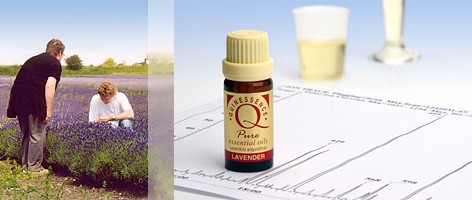
Essential Oil Quality
Only essential oils of the very highest quality should be used in aromatherapy, - and nothing less. Essential oil quality (together with its purity) is what determines the therapeutic activity of an essential oil. If it is not therapeutically active it will not work effectively in aromatherapy, therefore you won't get the benefits you and expect, deserve, - and have paid for.
If you want textbook results in aromatherapy you must use essential oils that were derived from a single verified botanical species and a known country of origin, cultivated using good agricultural practices, harvested at the optimum time, extracted with expertise, stored and transported correctly – and of course, not subjected to any form of adulteration.
An adulterated essential oil simply can't compete with the therapeutic power of a good quality essential oil, since it will not have a high enough percentage of the necessary active constituents to deliver an effective treatment. Having been diluted with a foreign substance to lower its price, this is the very opposite of a good quality essential oil.
Essential oil quality defined
The term 'quality' when applied to essential oils can be very subjective, since each industry that uses them does so according to their own specific requirements and standards. The needs of the aromatherapy market are quite different to those of the flavour and perfumery industries, for example. Above all else in aromatherapy we need essential oils that are therapeutically active, whereas for the perfumer or flavourist it is the aroma or taste that is the primary concern.
Of course, aroma is important to healthcare professionals, but the prime consideration must always be the healing benefits of an essential oil. So the first thing we discover about the notion of quality is that it can only be measured in relation to the purpose it will be used for. And according to industry analysts, less than 4% of the world's production of essential oil is used in true aromatherapy. This means that 96% of essential oils are produced for, and used in, other industries. Each industry sector has their own standards, and none of them are acceptable for aromatherapy, in my opinion.
Where does essential oil quality begin?
I believe that essential oil quality begins in the soil at the farm where the plants are grown, and this is why we have established close working relationships with growers around the world. You must have rich, fertile soil because it is the very foundation for growing healthy plants that have a bountiful supply of healing essential oils. Of course you don't find this information printed in the brochures of oil traders or distributors, you have to go and see it for yourself at the farm! Ideally, plants should also be grown under organic agricultural methods without the use of herbicides and pesticides too.
When growing plants specifically for the extraction of essential oils, the fertility of the soil the plant was grown in, the genetic differences in the plant, the variety, cultivation practices, the climate and the post-harvest handling will all have a significant effect on the resulting fragrance and bioactivity of an essential oil. This is why the country of origin is so important when discussing the quality of an essential oil, since the climatic and soil conditions greatly affect the oil producing cells within the plant.
Essential oil quality requires expertise
Experts at sourcing essential oils know precisely where the finest herbs and essential oils are produced, but it takes many years to acquire this knowledge and to also build up relationships with the producers and distilleries. In reality, few companies manufacturing or supplying true aromatherapy products today have been in business long enough to have gained such vital expertise.
At the extraction stage, the skill and experience of the distillery becomes the final critical factor in the quest for excellence, since all the hard work, patience and expertise of the farmer will have been wasted if the essential oil is not extracted correctly. No matter which method is used to obtain the oil, ultimately the final quality of an essential oil rests in the hands of the person conducting this final process – and there are no second chances in the art of extraction.
Therefore, to obtain the finest quality essential oils you once again require the services of an expert, and nothing less. This is a recurring theme in the quest for quality, since nothing of a high standard can ever be produced without expertise. Quality and expertise go hand-in-hand.
The true price of quality
All of the above highlights the importance of being discerning when purchasing essential oils, since no matter how convincing the sales blurb may be, quality never comes cheaply. You can't buy cheap gold and you can't buy good quality essential oils cheaply either - because exactly the same as gold, in bulk they are a traded commodity and have a market value.
It takes an enormous amount of money to plant and raise crops, extract the oils, and then ship them all around the world. To bring down prices compromises must be made somewhere. And no matter where they occur in the chain of events, compromises lead to poor quality essential oil, which in turn leads to poor results.
To guarantee a high level of quality at Quinessence, every essential oil is subjected to the most searching analytical procedures, including GC/MS chromatography, so that we can bring you the very best at direct from the factory prices.
Copyright © Quinessence Aromatherapy Ltd 2002. Written by Geoff Lyth
If you enjoyed this article, please click the 'Like' button and help spread the word:
See also Quinessence Essential Oils Range


